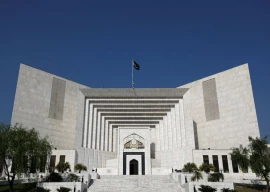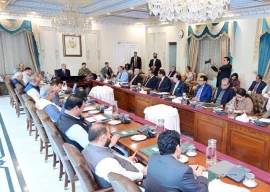
The Qazalbash clan is said to have originally been mercenaries who migrated from Turkestan, settling in the Indian plains in the last two or three centuries. Some became big landowners, some saints and one of them established a waqf (or trust) on several hundred acres of land near Lahore.
In 1980, the Federal Shariat Court found the land reforms of 1972 and 1977 to be in accordance with Islamic injunctions. But when General Ziaul Haq imposed his own brand of Islam, the clan resuscitated its case that land reforms were un-Islamic. In 1986, in Khyber-Pakhtunkhwa, tenants’ right of pre-emption was declared un-Islamic. Tenants would no longer be the first entitled to possession of land being sold or transferred. Landlords continued to rule the roost.
In 1989, through the Qazalbash verdict, 10 years after land reforms were declared Islamic, any ceiling on landholding was declared un-Islamic. One could be a monopolist, depriving all peasants of sustenance and that was still fine!
Maulana Taqi Usmani, who wrote the judgment against land reforms, himself gave the strongest arguments for reapportion of land, which could have been used against the Shariat decision. But no one seized the opportunity. He stated that protection of private property applied only if it was obtained, in the first place, through legitimate means.
But can the ‘gift’ of land by a coloniser, whose land it was not to give in the first place, be considered legitimate means? Such a gift was essentially nothing more than a bribe or reward to powerful locals to suppress their own people on the coloniser’s behalf.
Maulana Usmani went further: he wrote that if acquired by illegitimate means, it was the government’s duty to take back the land and either restore it to the original owners or give it to the needy! He also wrote that the protection enjoyed by property owners should not be looked at in isolation from duty to God and community. This leaves the door wide open for land reforms.
They were the views of the highly influential Maulana Maududi, who was stubbornly in favour of unqualified private land ownership, which created the deadlock. Quite possibly, as an urbanite, the dependence of economies on agriculture never occurred to him. He never addressed the evils of land concentration even theoretically. Unfortunately, he can no longer be asked about his opinion on whether gifting land to retiring military officers — but not peasants who keep entire populations fed — could be considered Islamic; or about leasing to untaxed foreign corporate investors and allowing them to repatriate all output and profits leaving nothing for the locals. The Qazalbash ruling turned out to be a windfall for landed politicians and reason enough never to bring up the land reform issue in parliament.
The weakest argument came from the then JUP chief who claimed that Islam has not fixed a limit on land holdings as personal property, nor calls for seizing property; and, therefore, the government cannot do it either. This is faulty logic. Just because Islam remained silent on a matter, it does not automatically follow that it is in its favour. The JUP chief was referring not to the Holy Quran but to claimed history and Traditions of the Holy Prophet (pbuh). Circumstances 1,400 years ago were different and kept changing.
The free gifts of nature start with land and water and include all that grows on it and the minerals that lie underground. Their use and exchange create economies and livelihoods. They translate into farms, factories, cities, technologies, transportation and communication networks, and much else. People and livestock have to eat. Ultimately, entire populations and economies rely on small farms.
For 10-15,000 years, most farms everywhere were no more than a few acres each. Farmers discovered through generations of observation of nature and experimentation that small-scale mixed-cropping maintained nature’s cycle best and guaranteed sustainability. But in the modern era, overdone corporate technology and acquisitive human nature upset the balance.
At a time when chronic hunger and abject poverty prevail and productivity from misguided agricultural technologies is dropping, the tillers on whom the entire country is dependent have to be given their rights. Overturning the last court decision has become urgent. A few acres for every rural family would overnight bring livelihoods to all and harvests far beyond what poisonous industrial agriculture can achieve, corporate propaganda notwithstanding. Over the past years, contrived political conflict and non-issues have consistently diverted attention away from development and justice to maintaining the status quo for unrepresentative politicians.
The Qazalbash verdict was not unanimous and the supposedly religious justifications were based on a single individual’s opinion and, therefore, highly debatable. According to one of the greatest Islamic jurists, Hazrat Imam Abu Hanifa, when a landlord takes crop produce from a tenant in return for his labour without the landlord himself also working in its cultivation, such an act is haram.
The Qazalbash Waqf case will have to be re-addressed and land reform in the public interest brought about. The origins of the institution of waqf itself may have to be re-examined. Do any laws govern them? Are their account books audited? If not, trust lands could become an easy cover for far less religious purposes and a convenient tool for political ends.
Published in The Express Tribune, May 22nd, 2012.

















COMMENTS
Comments are moderated and generally will be posted if they are on-topic and not abusive.
For more information, please see our Comments FAQ